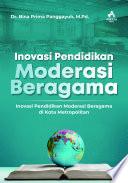
Inovasi Pendidikan Moderasi Beragama
Moderasi beragama adalah cara pandang, sikap dan perilaku beragama yang dianut dan dipraktikkan oleh sebagian besar penduduk negeri ini, dari dulu hingga sekarang. Pemahaman akan konsep moderasi beragama ini sangat perlu dimiliki setiap orang terutama pelajar. Ada berbagai cara yang bisa dilakukan pendidik dan lembaga pendidikan dalam proses implementasi pendidikan moderasi beragama. Di antaranya bisa dilakukan melalui beberapa langkah yaitu mengimplementasikan inovasi pendidikan moderasi beragama melalui kebijakan, pembelajaran, kegiatan ekstrakurikuler, pembiasaan, kegiatan keagamaan, dan kerjasama. Dalam buku ini, akan dipaparkan pemahaman konsep moderasi beragama pelajar khususnya di kota metropolitan dan bentuk inovasinya dalam pendidikan Moderasi beragama.
- ISBN 13 : 6234194184
- ISBN 10 : 9786234194180
- Judul : Inovasi Pendidikan Moderasi Beragama
- Pengarang : Dr. Bina Prima Panggayuh, M.Pd.,
- Kategori : Antiques & Collectibles
- Penerbit : AMERTA MEDIA
- Bahasa : id
- Halaman : 7
- Google Book : http://books.google.co.id/books?id=vwnPEAAAQBAJ&dq=intitle:Moderasi+Beragama&hl=&source=gbs_api
-
Ketersediaan :
Di antaranya bisa dilakukan melalui beberapa langkah yaitu mengimplementasikan inovasi pendidikan moderasi beragama melalui kebijakan, pembelajaran, kegiatan ekstrakurikuler, pembiasaan, kegiatan keagamaan, dan kerjasama.








